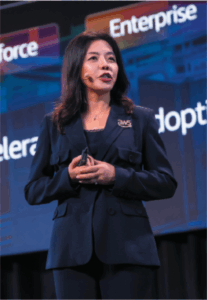
AWS ExecLeaders Singapore, held in conjunction with AWS Summit Singapore on May 29, 2025 at the Sands Expo & Convention Centre, brought together prominent business leaders and senior executives to explore how they are leveraging technology to drive their organizations forward. Themed “From Possibility to Practice,” ExecLeaders is the dedicated executive forum of AWS Summit, offering C-suite leaders and industry experts a platform for strategic dialogue on digital innovation, leadership and the critical business imperatives of transformation, agility and resilience.

Priscilla Chong, Country Manager of AWS Singapore, opened her welcome address at the summit by reflecting on Singapore’s transformation into a global powerhouse, as the nation celebrates 60 years of independence. Chong highlighted that this journey has been driven by three key pillars: people and culture, governance and process, and technology.
“Singapore succeeded because of its unique cultural DNA—rooted in multiculturalism, meritocracy and the relentless pursuit of excellence,” she said. “Today, teaching hard skills alone is no longer enough. We must combine the human touch with the capabilities of AI and technology.”
To support this vision, AWS has committed S$12 billion (US$9.3 billion) to strengthen Singapore’s digital infrastructure through 2028, expanding cloud and AI adoption. The company is also partnering with the Singapore government through various initiatives, such as SkillsFuture, to help prepare the workforce for the future.
“With the recent launch of Amazon Bedrock and the expansion of other AI services in Asia-Pacific and Singapore, we’re not just helping organizations deploy AI—we’re also taking a sector-specific approach to support key industries such as manufacturing, financial services and retail,” she added.

Elevate, Energize, Envision
Miriam McLemore, Enterprise Strategist at AWS, emphasized during her keynote that agility is crucial to driving innovation. She encouraged businesses to view constraints not as obstacles but as accelerators of progress. With a strong foundation in place, leaders can drive transformation by adopting three key practices: elevate, energize and envision.
McLemore said that to elevate, organizations must break free from traditional governance structures that slow innovation. For example, decentralizing by default can help avoid bottlenecks. To energize teams, leaders should equip them with the right skills, capabilities and tools. Having small, empowered teams with a clear mission can be incredibly powerful for any organization. Creating an environment of continuous feedback also fuels learning, sparks innovation and builds collective intelligence. She encouraged companies to reimagine how they onboard new capabilities as well.
“Think about different ways of introducing new capabilities to your organization so that you drive ownership, curiosity, mastery and clarity of purpose,” McLemore said.
Finally, to envision real transformation, leaders must step up and be bold. “Transformation is about having a clear vision,” she noted.
Lead the AI Transformation
The first panel, titled “Navigating the GenAI Revolution: Strategies for Executive Leadership,” was moderated by Jeff Johnson, Managing Director, ASEAN, AWS. The panel featured Nikhil Eapen, CEO of StarHub Group; Rob Schimek, CEO of bolttech and Professor Eugene Fidelis Soh, Deputy Group CEO (Population Health) of National Healthcare Group.
Eapen shared insights on how StarHub modernized its digital infrastructure by adopting a hybrid multi-cloud approach to enhance customer and user experiences across different end customers. The telco is utilizing agentic AI to unify technical data for deeper insights into customer behavior.
Meanwhile, the National Healthcare Group, serving 1.5 million residents in central and northern Singapore, is harnessing data and AI to improve the quality of life of an aging population and “return the ‘health’ to healthcare,” said Prof Soh. He noted that Singaporeans have one of the longest life expectancies in the world at 85 years but spend the last decade in poor health. The challenge is to close the gap between lifespan and healthspan by eliminating those 10 unhealthy years per individual, collectively adding 15 million healthy years to the population.
“AI has helped the organization better understand population needs, develop risk segmentation models and more precisely target screening efforts,” Prof Soh said. “It also enables timely interventions. The data we bring together supports an integrated model of care we call the ‘river of life’—and AI powers this journey.”
Schimek explained that bolttech, as an insurtech, operates at the intersection of insurance and technology. “AI is transforming every part of the insurance value chain—from sales and risk assessment to underwriting and customer service,” he said. Technology enables bolttech to offer dynamic pricing and hyper-personalization, delivering tailored, affordable and accessible products to its clients.

Adapt to Stay Resilient
The second panel, titled “Breaking the Code: The Role of Women Leaders in Advancing Organizations and Technology” and held in partnership with Forbes Asia, was moderated by Rana Wehbe Watson, Editorial Director at Forbes Asia. The panel featured Mai-Lan Tomsen Bukovec, VP of Technology at AWS and Lai Pei-Si, Group CEO of GXS Bank.
Bukovec noted that AI innovation is accelerating at an unprecedented pace, making AI proficiency essential for everyone as AI assistants become embedded in nearly every workflow. Leadership is also evolving, she noted, with C-suite executives across industries now deeply engaged with AI to stay ahead and lead their organizations from the front.
Agreeing with Bukovec, Lai emphasized that leadership must be proactive in navigating what could be the most significant technological shift in a decade. She highlighted that adaptability and an open mindset are crucial for future resilience. As a digital bank, GXS Bank focuses on driving financial inclusion, with AI playing a critical role in helping solve real-world problems, such as addressing underserved needs in Southeast Asia.
In response to how women leaders could create more opportunities for other women to advance in the tech industry, Bukovec said, “I’m a big believer of human potential being everywhere, regardless of one’s background or gender. Anyone who comes through the door is coming through based on the merits of their inherent talent.”
She highlighted that the next generation of AI with speech capabilities will lower barriers to entry, allowing people to engage with technology without needing deep technical knowledge. “I think that’s going to have an incredible effect on the workforce of tomorrow; it will bring everyone through the door,” Bukovec added.
The AWS Summit Singapore was the second installment in the AWS 2025 ASEAN Summit series, following the first event in Bangkok and ahead of the next in Jakarta.
